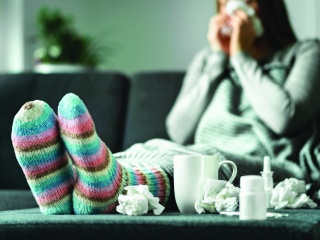Flu (Influenza)
Flu Care at UVM Health
Flu (short for influenza) is a highly contagious respiratory illness caused by the influenza A or B viruses. Some people with flu have mild to moderate symptoms while others develop life-threatening problems that require hospitalization. The flu vaccine can lower your risk of flu and minimize symptoms if you do get sick.
At University of Vermont Health, the diagnosis and treatment of flu may start with your primary care provider, at an urgent care or another location in our health system. We offer care that’s convenient for you, through Vermont and northern New York.

Why Choose UVM Health?
As one of the leading providers of primary care services in the region, we offer:
- Science-based care: We offer the latest research-based flu treatments. Our providers are active in flu research and clinical trials, ensuring you receive the most effective care.
- Streamlined access to the flu vaccine: We make it easier for you to protect your health by offering the flu vaccine at multiple locations throughout UVM Health.
- Comprehensive flu treatments: Should you get the flu, our providers start appropriate treatments to help you feel better faster and lower your risk of serious illness. Our specialists work together to provide complete care for flu and flu-related complications.
Flu Symptoms
Flu symptoms affect everyone differently and can range from mild to life-threatening. The severity of symptoms depends on factors like your age, overall health and vaccination status. People who have chronic health conditions or weakened immune systems are more at risk for serious complications and hospitalization.
Flu symptoms tend to come on suddenly and include:
- Cough, congestion or runny nose
- Fatigue
- Fever and chills
- Headaches
- Muscle or body aches
- Shortness of breath or breathing problems
- Sore throat
- Vomiting and diarrhea (more common in children)
Diagnosing Flu
There are different tests to diagnose flu.
Molecular flu tests are the most accurate method for diagnosing flu. The tests check for genetic material found in flu viruses.
Molecular tests take place in two ways:
- Standard molecular flu test: A provider uses a swab to collect samples from your nose or mouth. The sample goes to a lab where a technician looks for the flu virus. You get the results in a few days.
- Rapid molecular flu test: Your provider uses a test kit to collect a sample from your nose or mouth. The test kit provides results in 15 to 30 minutes.
Molecular flu tests are available from:
Antigen tests, more commonly known as rapid flu tests, provide results in less than 20 minutes. They take place at a health care facility. The tests check for proteins (antigens) found on the surface of influenza viruses. Rapid flu tests are more likely than molecular tests to give a false-negative reading. This means the test shows you don’t have the flu when you really do.
An at-home rapid molecular test can detect influenza A and B viruses, as well as the COVID-19 virus, in less than 30 minutes. These viruses cause similar symptoms, making it difficult to know which illness you have. An accurate diagnosis is important because there are different treatments for flu and COVID-19.
The Lucira® COVID-19 and Flu Test is a self-administered test that uses a nasal swab sample to check for flu and COVID-19. The combination rapid test may be available online.
Flu Treatments
Our health care teams customize flu treatment plans based on your age, risk factors and symptom severity. At UVM Health, we offer the latest, most effective flu treatments.
At-home flu care may include:
- Isolating: Stay home and avoid contact with others until you’re fever-free for at least 24 hours without the use of fever-reducing medications.
- Masking: If you must be around others, wear a mask. You should wear a mask until you’re fever-free and no longer in isolation.
- Medicating: Talk to your provider about taking over-the-counter medications to ease fever, congestion, sore throat and other flu symptoms.
- Taking it easy: You can help your body fight the flu virus by resting. It’s also important to drink plenty of fluids to prevent dehydration.
Antiviral medications help your body fight the viruses that cause flu. These drugs can lessen the severity of symptoms and shorten how long you’re sick. Antivirals work best when you start them within two days of the onset of flu symptoms. But they can still help if you start them later.
Antiviral medications for flu include:
- Baloxavir marboxil (Xofluza®): You take one dose of an oral pill or liquid medication.
- Oseltamivir phosphate (Tamiflu®): You take oral pills or liquid medication for several days.
- Peramivir (Rapivap®): You receive one IV treatment.
- Zanamivir (Relenza®): You breathe in this medication through an inhaler for several days.
Stay Protected This Virus Season
Staying up to date on your vaccines helps reduce the severity and length of respiratory illness, protecting both you and your loved ones.
Get vaccinated today!
Flu, COVID-19 and RSV vaccines are available at local pharmacies and clinics.

Locations Near You
Share your location to see nearby providers and availability
15 Fourth Street
Malone, NY 12953-1340
87 Paine Mountain Drive
Northfield, VT 05663-5791
159 Margaret Street
Suite 100
Plattsburgh, NY 12901-1874
18 Community Center
Wilmington, NY 12997
156 Main Street
Montpelier, VT 05602
577 County Route 1
Fort Covington, NY 12937-2805
246 Granger Road
Suite 1
Berlin, VT 05602-5352
1 South Prospect Street
Level 3
Burlington, VT 05401-5505
353 Blair Park Road
Williston, VT 05495-7530
44 Collins Drive
Middlebury, VT 05753-8502


